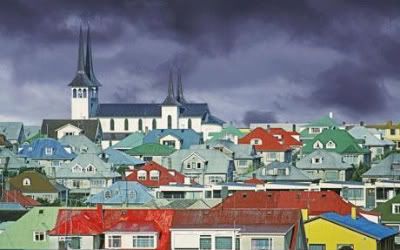
The shockwaves from the country's economic implosion are being felt in Britain, but the effects are far worse at home
Iceland's humiliation begins at Heathrow. Try buying the currency, the krona, at Travelex and you will discover it is no longer held. "And whatever you do," says the woman at the counter, "don't bring any back." The words "failed state" bring to mind ungovernable Third World hell-holes, but Iceland is a new kind of failed state, a financially failed one. Without cash from the International Monetary Fund it would be as near to bankrupt as a country can be.
The latest aftershock was felt in Britain this week when the holding company Baugur, with stakes in a string of British high street chains, went into administration. The group, which has major shareholdings in House of Fraser, Iceland, Hamleys, and Mappin & Webb, collapsed with debts of more than £1 billion. The future of 3,500 stores and some 50,000 jobs is in doubt.
However, the turmoil engulfing Iceland's economy is far from evident on arriving at Keflavik airport, 40 minutes' drive from the capital, Reykjavik. The air is clean, the roads good and the houses that dot the stark volcanic landscape well maintained. The cars are big, too: four-wheel drives and high-end marques. But then the stories begin. The taxi driver on the Keflavik run was in his sixties, respectable, softly-spoken and, to all intents and purposes, bankrupt.
"I keep on working and pay what I can. The bank knows I can't do more. There is no point in shutting me down."
His tale is similar to thousands of others. He had needed a new car and went to his bank for a loan – Icelanders, for so long a frugal people dependent on fish and agriculture, have become as addicted to debt as the British. His lender suggested using a "currency basket", made up of different strong currencies, to buy a secondhand Cadillac from America because the krona was weak. The little currency had suffered from volatility in the past but no one predicted what came next. In October, the banking system imploded under the weight of an enormous mountain of debt. The three big banks had boasted assets many times the size of the country's GDP, but their liabilities were of a similar order. When the government nationalised the banks, it was left with liabilities in excess of $60 billion (£40 billion), more than three times GDP. The krona nose-dived and borrowers like the taxi driver woke up one cloudy morning to discover that, in krona terms, their loans had doubled in size. With the krona effectively dead, the country has been forced to seek the shelter of a bigger currency – probably the euro. >>> Neil Tweedie | Saturday, February 7, 2009
The Dawning of a New Dark Age (Paperback & Hardback) – Free delivery >>>